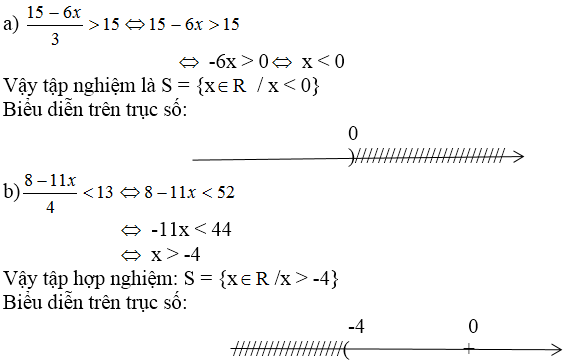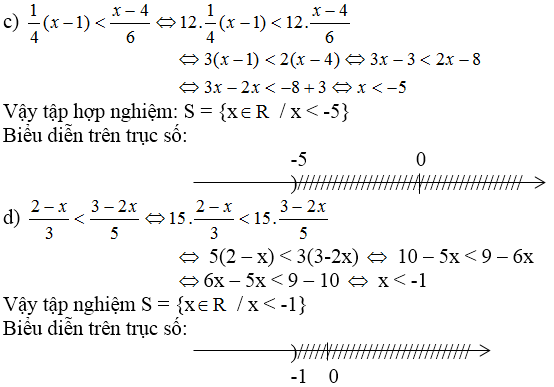Hãy nhập câu hỏi của bạn vào đây, nếu là tài khoản VIP, bạn sẽ được ưu tiên trả lời.

a)Ta có : \(\dfrac{x+1}{1-x}\)( giữ nguyên )
\(\dfrac{x^2-2}{1-x}\)( giữ nguyên )
\(\dfrac{2x^2-x}{x-1}=\dfrac{x-2x^2}{1-x}\)
b)Ta có : \(\dfrac{1}{x-1}=\dfrac{x^2+x+1}{\left(x-1\right)\left(x^2+x+1\right)}=\dfrac{x^2+x+1}{x^3-1}\)
\(\dfrac{2x}{x^2+x+1}=\dfrac{2x\left(x-1\right)}{\left(x-1\right)\left(x^2+x+1\right)}=\dfrac{2x^2-2x}{x^3-1}\)
\(\dfrac{2x-3x^2}{x^3-1}\)(giữ nguyên )
c) MTC = ( x+ 2)2(x - 2)2
Do đó , ta có : \(\dfrac{1}{x^2+4x+4}=\dfrac{1}{\left(x+2\right)^2}=\dfrac{\left(x-2\right)^2}{\left(x+2\right)^2\left(x-2\right)^2}\)
\(\dfrac{1}{x^2-4x+4}=\dfrac{1}{\left(x-2\right)^2}=\dfrac{\left(x+2\right)^2}{\left(x-2\right)^2\left(x+2\right)^2}\)
\(\dfrac{x}{x^2-4}=\dfrac{x}{\left(x+2\right)\left(x-2\right)}=\dfrac{x\left(x^2-2^2\right)}{\left(x+2\right)^2\left(x-2\right)^2}=\dfrac{x^3-4x}{\left(x+2\right)^2\left(x-2\right)^2}\)
d) MTC = xyz( x - y)( y - z)( x - z)
Do đó , ta có : \(\dfrac{1}{x\left(x-y\right)\left(x-z\right)}=\dfrac{yz\left(y-z\right)}{xyz\left(x-y\right)\left(y-z\right)\left(x-z\right)}\)
\(\dfrac{1}{y\left(y-x\right)\left(y-z\right)}=\dfrac{-xz\left(x-z\right)}{xyz\left(x-y\right)\left(y-z\right)\left(x-z\right)}\)
\(\dfrac{1}{z\left(z-x\right)\left(z-y\right)}=\dfrac{xy\left(x-y\right)}{xyz\left(x-y\right)\left(y-z\right)\left(x-z\right)}\)
Cộng các phân thức lại ta có :
\(\dfrac{yz\left(y-z\right)}{xyz\left(x-y\right)\left(y-z\right)\left(x-z\right)}\)+\(\dfrac{-xz\left(x-z\right)}{xyz\left(x-y\right)\left(y-z\right)\left(x-z\right)}\)+\(\dfrac{xy\left(x-y\right)}{xyz\left(x-y\right)\left(y-z\right)\left(x-z\right)}\)
= \(\dfrac{yz\left(y-z\right)-xz\left(x-z\right)+xy\left(x-y\right)}{xyz\left(x-y\right)\left(y-z\right)\left(x-z\right)}\)

Bài 1:
a) \(\dfrac{2x-3}{35}+\dfrac{x\left(x-2\right)}{7}>\dfrac{x^2}{7}-\dfrac{2x-3}{5}\)
{bước 1 là quy đồng bỏ mẫu, bạn chọn mẫu là BCNN của các mẫu số ở tất cả các phân thức trong BPT, phải chọn MC là BCNN vì số càng đơn giản càng dễ tính toán}
\(\Leftrightarrow2x-3+5x^2-10x>5x^2-14x+21\)
{chuyển vế}
\(\Leftrightarrow2x-10x+14x>21+3\) \(\Leftrightarrow6x>24\)
{chia cả 2 vế của bpt cho 6}
\(\Leftrightarrow x>4\)
Vậy nghiệm của BẤT phương trình là x>4
{bạn chú ý là bất phương trình chứ KHÔNG PHẢI là nghiệm của phương trình nhé}
cũng có thể kết luận thế này: Vậy S={x|x>4}
hay biểu diễn trên trục số (nếu đề yêu cầu)
{khi đã biểu diễn trên trục số thì bạn không cần phải kết luận như 2 cách trên nữa nhé, dư đấy.}
1b)
\(\dfrac{6x+1}{18}+\dfrac{x+3}{12}\le\dfrac{5x+3}{6}+\dfrac{12-5x}{9}\)
{tương tự: quy đồng bỏ mẫu}
\(\Leftrightarrow12x+2+3x+9\le30x+18+48-20x\)
{chuyển vế các hạng tử}
\(\Leftrightarrow15x-10x\le66-11\)\(\Leftrightarrow5x\le55\)
{chia cả 2 vế cho 5}
\(\Leftrightarrow x\le11\)
Vậy \(x\le11\)
(cách kết luận như câu a, nói rồi không nói lại nhé ^^!)

a) 3x+2(x-5)=-x+2
<=> 3x+2x+x=2+10
<=>6x=12
<=>x=2
b) 3x2-2x=0
<=>x(3x-2)=0
<=>\(\left[{}\begin{matrix}x=0\\3x-2=0\end{matrix}\right.\)
<=>\(\left[{}\begin{matrix}x=0\\x=\dfrac{2}{3}\end{matrix}\right.\)
c) \(\dfrac{2x}{3}\)+\(\dfrac{x-4}{6}\)=2-\(\dfrac{x}{2}\)
<=>\(\dfrac{8x+2x-8}{12}\)=\(\dfrac{24-6x}{12}\)
<=> 8x+2x-8=24-6x
<=>8x+2x+6x=24+8
<=>16x=32
<=>x=2
d) \(\dfrac{x-2}{x+2}\)-\(\dfrac{3}{x-2}\)= -\(\dfrac{2\left(x-11\right)}{4-x^2}\) ( ĐKXĐ: x\(\ne\)\(\pm\)2)
<=> \(\dfrac{\left(x-2\right)^2-3\left(x+2\right)}{x^2-4}\)=\(\dfrac{2\left(x-11\right)}{x^2-4}\)
=> (x-2)2-3(x+2)=2(x-11)
<=> x2-4x+4-3x-6=2x-22
<=> x2-4x-3x-2x=-22-4+6
<=> x-9x+20=0
<=> (x-4)(x-5)=0
<=>\(\left[{}\begin{matrix}x=4\\x=5\end{matrix}\right.\) ( thỏa mãn diều kiện )
d) (x2+1)(x2-4x+4)=0
=> x2-4x+4=0 (x2+1\(\ge\)1 với mọi x)
=>(x-2)2 =0
=>x=2

a, \(6x^2-5x+3=2x-3x\left(3-2x\right)\)
⇔ \(6x^2-5x+3=2x-9x+6x^2\)
⇔ \(6x^2-5x+3-6x^2+9x-2x=0\)
⇔ \(2x+3=0\)
⇔ \(2x=-3\)
⇔ \(x=-\dfrac{3}{2}\)
b, \(\dfrac{2\left(x-4\right)}{4}-\dfrac{3+2x}{10}=x+\dfrac{1-x}{5}\)
⇔ \(\dfrac{20\left(x-4\right)}{4.10}-\dfrac{4\left(3+2x\right)}{4.10}=\dfrac{5x}{5}+\dfrac{1-x}{5}\)
⇔ \(\dfrac{20x-80}{40}-\dfrac{12+8x}{40}=\dfrac{5x+1-x}{5}\)
⇔ \(\dfrac{20x-80-12-8x}{40}=\dfrac{4x+1}{5}\)
⇔ \(\dfrac{12x-92}{40}-\dfrac{4x+1}{5}=0\)
⇔ \(\dfrac{12x-92}{40}-\dfrac{8\left(4x+1\right)}{40}=0\)
⇔ \(12x-92-8\left(4x+1\right)=0\)
⇔ 12x - 92 - 32x - 8 = 0
⇔ -100 - 20x = 0
⇔ 20x = -100
⇔ x = -100 : 20
⇔ x = -5

giải pt sau
g) 11+8x-3=5x-3+x
\(\Leftrightarrow\) 8x + 8 = 6x - 3
<=> 8x-6x = -3 - 8
<=> 2x = -11
=> x=-\(\dfrac{11}{2}\)
Vậy tập nghiệm của PT là : S={\(-\dfrac{11}{2}\)}
h)4-2x+15=9x+4-2x
<=> 19 - 2x = 7x + 4
<=> -2x - 7x = 4 - 19
<=> -9x = -15
=> x=\(\dfrac{15}{9}=\dfrac{5}{3}\)
Vậy tập nghiệm của pt là : S={\(\dfrac{5}{3}\)}
g)\(\dfrac{3x+2}{2}-\dfrac{3x+1}{6}=\dfrac{5}{3}+2x\)
<=> \(\dfrac{3\left(3x+2\right)}{6}-\dfrac{3x+1}{6}=\dfrac{5.2+6.2x}{6}\)
<=> 9x + 6 - 3x + 1 = 10 + 12x
<=> 6x + 7 = 10 + 12x
<=> 6x -12x = 10-7
<=> -6x = 3
=> x= \(-\dfrac{1}{2}\)
Vậy tập nghiệm của PT là : S={\(-\dfrac{1}{2}\)}
\(h,\dfrac{x+4}{5}-x+4=\dfrac{4x+2}{5}-5\)
<=> \(\dfrac{x+4-5\left(x+4\right)}{5}=\dfrac{4x+2-5.5}{5}\)
<=> x + 4 - 5x - 20 = 4x + 2 - 25
<=> x - 5x - 4x = 2-25-4+20
<=> -8x = -7
=> x= \(\dfrac{7}{8}\)
Vậy tập nghiệm của PT là S={\(\dfrac{7}{8}\)}
\(i,\dfrac{4x+3}{5}-\dfrac{6x-2}{7}=\dfrac{5x+4}{3}+3\)
<=> \(\dfrac{21\left(4x+3\right)}{105}\)-\(\dfrac{15\left(6x-2\right)}{105}\)=\(\dfrac{35\left(5x+4\right)+3.105}{105}\)
<=> 84x + 63 - 90x + 30 = 175x + 140 + 315
<=> 84x - 90x - 175x = 140 + 315 - 63 - 30
<=> -181x = 362
=> x = -2
Vậy tập nghiệm của PT là : S={-2}
K) \(\dfrac{5x+2}{6}-\dfrac{8x-1}{3}=\dfrac{4x+2}{5}-5\)
<=> \(\dfrac{5\left(5x+2\right)}{30}-\dfrac{10\left(8x-1\right)}{30}=\dfrac{6\left(4x+2\right)-150}{30}\)
<=> 25x + 10 - 80x - 10 = 24x + 12 - 150
<=> -55x = 24x - 138
<=> -55x - 24x = -138
=> -79x = -138
=> x=\(\dfrac{138}{79}\)
Vậy tập nghiệm của PT là S={\(\dfrac{138}{79}\)}
m) \(\dfrac{2x-1}{5}-\dfrac{x-2}{3}=\dfrac{x+7}{15}\)
<=> \(\dfrac{3\left(2x-1\right)-5\left(x-2\right)}{15}=\dfrac{x+7}{15}\)
<=> 6x - 3 - 5x + 10 = x+7
<=> x + 7 = x+7
<=> 0x = 0
=> PT vô nghiệm
Vậy S=\(\varnothing\)
n)\(\dfrac{1}{4}\left(x+3\right)=3-\dfrac{1}{2}\left(x+1\right)-\dfrac{1}{3}\left(x+2\right)\)
<=> \(\dfrac{1}{4}x+\dfrac{3}{4}=3-\dfrac{1}{2}x-\dfrac{1}{2}-\dfrac{1}{3}x-\dfrac{2}{3}\)
<=> \(\dfrac{1}{4}x+\dfrac{1}{2}x+\dfrac{1}{3}x=3-\dfrac{1}{2}-\dfrac{2}{3}-\dfrac{3}{4}\)
<=> \(\dfrac{13}{12}x=\dfrac{13}{12}\)
=> x= 1
Vậy S={1}
p) \(\dfrac{x}{3}-\dfrac{2x+1}{6}=\dfrac{x}{6}-6\)
<=> \(\dfrac{2x-2x+1}{6}=\dfrac{x-36}{6}\)
<=> 2x -2x + 1= x-36
<=> 2x-2x-x = -37
=> x = 37
Vậy S={37}
q) \(\dfrac{2+x}{5}-0,5x=\dfrac{1-2x}{4}+0,25\)
<=> \(\dfrac{4\left(2+x\right)-20.0,5x}{20}=\dfrac{5\left(1-2x\right)+20.0,25}{20}\)
<=> 8 + 4x - 10x = 5 - 10x + 5
<=> 4x-10x + 10x = 5+5-8
<=> 4x = 2
=> x= \(\dfrac{1}{2}\)
Vậy S={\(\dfrac{1}{2}\)}
g) \(11+8x-3=5x-3+x\)
\(\Leftrightarrow8+8x=6x-3\)
\(\Leftrightarrow8x-6x=-3-8\)
\(\Leftrightarrow2x=-11\)
\(\Leftrightarrow x=-\dfrac{11}{2}\)
h, \(4-2x+15=9x+4-2x\)
\(\Leftrightarrow-2x-9x+2x=4-4-15\)
\(\Leftrightarrow-9x=-15\)
\(\Leftrightarrow x=\dfrac{-15}{-9}=\dfrac{5}{3}\)

a: \(\Leftrightarrow20x^2-12x+15x+5< 10x\left(2x+1\right)-30\)
\(\Leftrightarrow20x^2+3x+5< 20x^2+10x-30\)
=>3x+5<10x-30
=>-7x<-35
hay x>5
b: \(\Leftrightarrow4\left(5x-20\right)-6\left(2x^2+x\right)>4x\left(1-3x\right)-15x\)
\(\Leftrightarrow20x-80-12x^2-6x>4x-12x^2-15x\)
=>14x-80>-11x
=>25x>80
hay x>16/5


1: =>2(x+2)>3x+1
=>2x+4-3x-1>0
=>-x+3>0
=>-x>-3
=>x<3
2: =>12x^2-2x>12x^2+9x-8x-6
=>-2x>-x-6
=>-x>-6
=>x<6
3: =>4(x+1)-12>=3(x-2)
=>4x+4-12>=3x-6
=>4x-8>=3x-6
=>x>=2
4: =>-5x<=15
=>x>=-3
5: =>3(x+2)-5(x-2)<30
=>3x+6-5x+10<30
=>-2x+16<30
=>-2x<14
=>x>-7
6: =>5(x+2)<3(3-2x)
=>5x+10<9-6x
=>11x<-1
=>x<-1/11
giải giúp mik nốt 4 câu còn lại đc ko ạ